牛津译林版(2020)选择性必修第一册Unit2The Universal Language Extended Reading Beethoven a remarkable life课件(27张ppt
文档属性
| 名称 | 牛津译林版(2020)选择性必修第一册Unit2The Universal Language Extended Reading Beethoven a remarkable life课件(27张ppt |  | |
| 格式 | pptx | ||
| 文件大小 | 35.1MB | ||
| 资源类型 | 教案 | ||
| 版本资源 | 牛津译林版(2019) | ||
| 科目 | 英语 | ||
| 更新时间 | 2023-02-17 16:52:37 | ||
图片预览

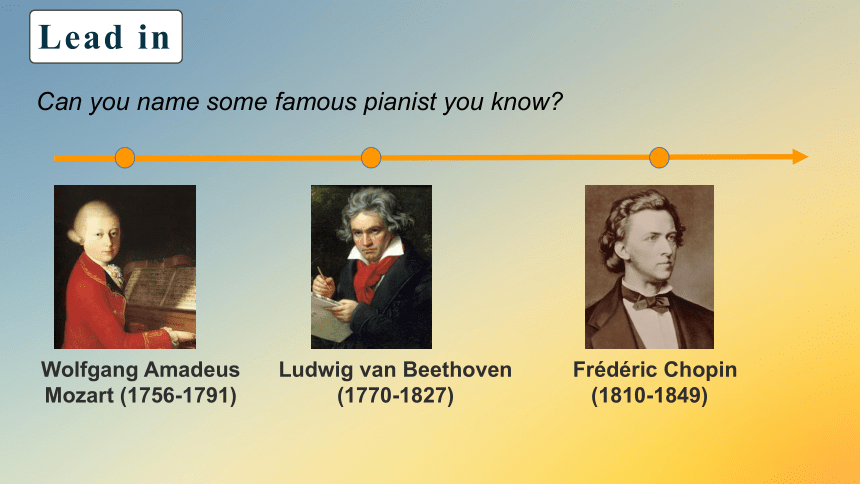
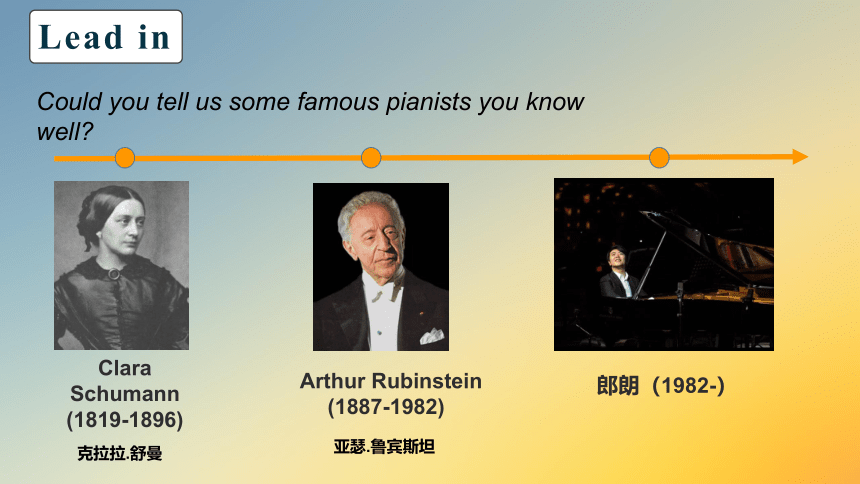
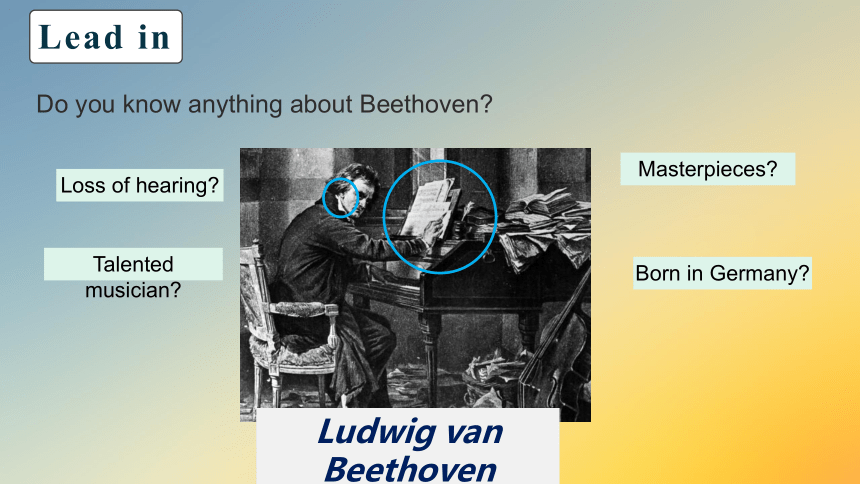
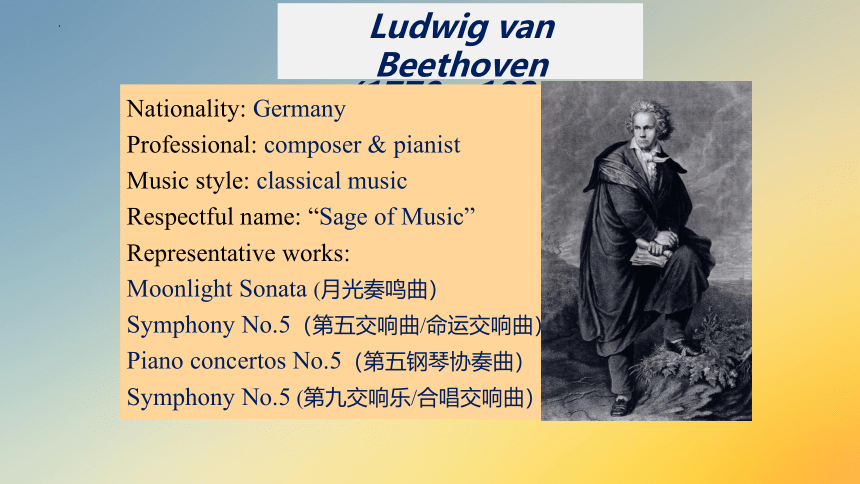
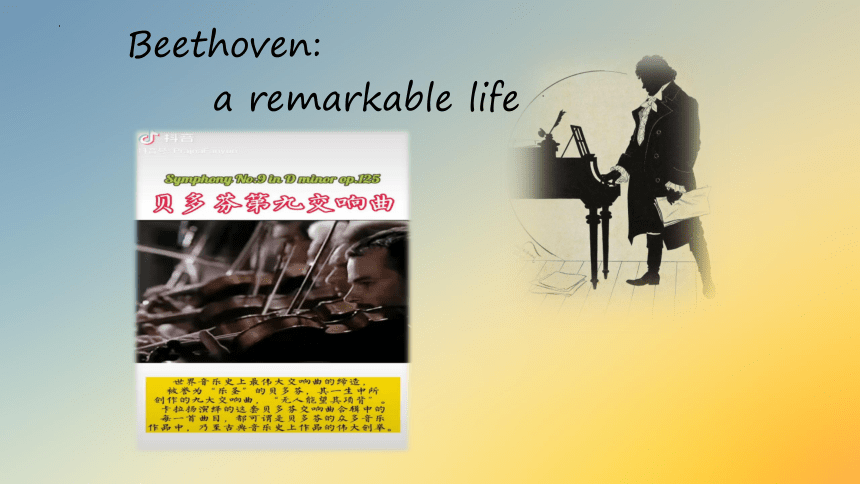
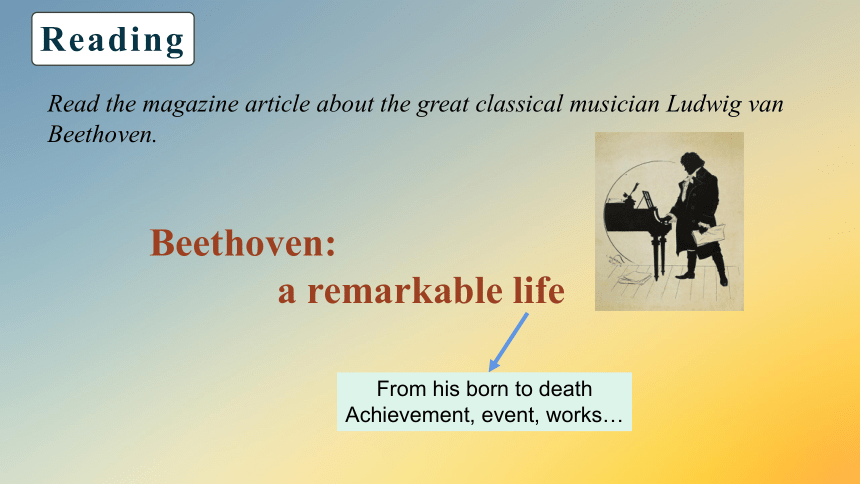
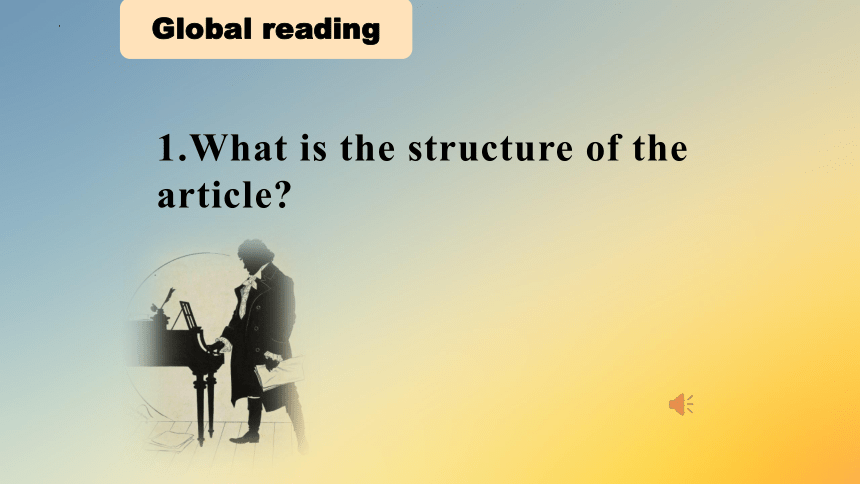
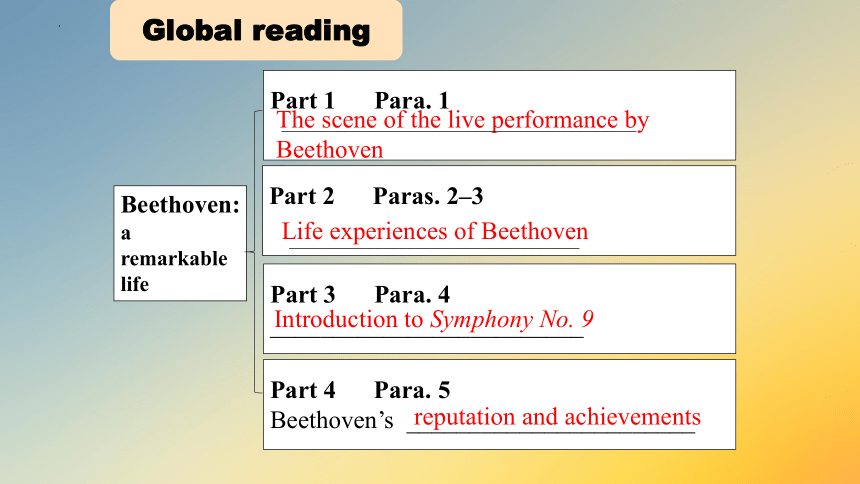
文档简介
(共27张PPT)
Beethoven: a remarkable life
B4U2 Extended Reading
Lead in
Can you name some famous pianist you know
Wolfgang Amadeus Mozart (1756-1791)
Ludwig van Beethoven (1770-1827)
Frédéric Chopin
(1810-1849)
Lead in
Could you tell us some famous pianists you know well
Clara Schumann
(1819-1896)
Arthur Rubinstein
(1887-1982)
克拉拉.舒曼
亚瑟.鲁宾斯坦
郎朗(1982-)
Lead in
Do you know anything about Beethoven
Masterpieces
Loss of hearing
Talented musician
Born in Germany
Ludwig van Beethoven
(1770—1827)
Ludwig van Beethoven
(1770—1827)
Nationality: Germany
Professional: composer & pianist
Music style: classical music
Respectful name: “Sage of Music”
Representative works:
Moonlight Sonata (月光奏鸣曲)
Symphony No.5(第五交响曲/命运交响曲)
Piano concertos No.5(第五钢琴协奏曲)
Symphony No.5 (第九交响乐/合唱交响曲)
Beethoven:
a remarkable life
Reading
Read the magazine article about the great classical musician Ludwig van Beethoven.
Beethoven:
a remarkable life
From his born to death
Achievement, event, works…
Global reading
1.What is the structure of the article
Beethoven:
a remarkable life
Part 1 Para. 1
Part 2 Paras. 2–3
Part 3 Para. 4 _________________________
Part 4 Para. 5
Beethoven’s _______________________
Introduction to Symphony No. 9
reputation and achievements
The scene of the live performance by Beethoven
Life experiences of Beethoven
Global reading
____________________________________
____________________________________________
Para. 1 Beethoven’s first performance
Read for details
1. What was the audience’s response to Beethoven’s live performance
2. How do you think Beethoven felt seeing the audience’s response
· broke into enthusiastic cheers
· standing, clapping, waving their hats
and handkerchiefs
astonished, admired, moved,
respectful
calm
content
comfortable
Paras. 2-3 Beethoven’s early life and suffering
This part is organized in the order of _____. How do you find that
time
As a gifted
child
Not long after
As a teenager
In late twenties
studying music
day and night
being appreciated for his piano performances
suffering the worst possible twist: gradual loss of hearing
enjoying a reputation as a wonderful young musician
Read for details
Paras. 2-3 Beethoven’s early life and suffering
How did Beethoven feel at the loss of hearing
Did he give in
How did he struggle against fate
use a variety of hearing aids to increase the amount of sound he could take in
When composing music at the piano, he would put one end of a pencil in his mouth and place the other end against the instrument so that he could feel the notes.
eg.
depressed, upset
Read for details
Bone conduction
Para. 4 Beethoven’s Symphony No.9
Read for details
The first movement
The next two movements
The fourth movement
Starts _______, but all of a sudden the whole orchestra breaks into an ________ theme.
Full of _________ lows and ________ highs.
All of the different variations are connected into a ______ chorus.
optimism
suffering&the strong will to fight suffering
determination
quietly
energetic
desperate
uplifting
joyful
Read for details
Para. 5 Beethoven’s achievements
Beethoven is regarded as one of the most remarkable musicians for his ______________________ and for his __________________ _________________.
amazing achievements
determination even
in his darkest days
Why is Beethoven regarded as one of the most remarkable musicians in history
Critical thinking
On 7 May 1824, a crowd of music lovers streamed into a theatre in Vienna to hear ... Beethoven’s Symphony No. 9 (Para. 1)
Symphony No. 9 was Beethoven’s last major piece of music in ... (Para. 2)
When Beethoven presented Symphony No. 9 in Vienna in 1824, it was his first time ... (Para. 3)
Since that day, Beethoven’s Symphony No. 9 has become one of the most famous and treasured pieces ... (Para. 4)
As Beethoven’s last great work, his Symphony No. 9 was also a grand finale to his life ... (Para. 5)
Symphony No. 9
1.What the use of Symphony No.9 in this article
string
⑤
③
①
④
②
Symphony No. 9
Why does the author choose
Symphony No. 9 as the string of the whole passage
●last major piece of music
●one of the most famous pieces in the history of classical music
●showing Beethoven’s genius
●indicating twists and turns of the musician’s life and reflecting his strong will
Beethoven: a remarkable life
Read for theme
diligence
talent
optimism
determination
persistence
What do you think makes a great musician
passion
flashback
In some texts, the events are not put exactly in time order; instead, an event that happened earlier is put in the middle of the main story, which is called flashback. You can tell you are reading a flashback when the story goes back to the past with a change of scene. There is usually a transitional sentence to indicate the change.
Writing technique
Para. 1
Para. 2
Para. 3
Para. 4
Appreciation
Flashback
Life and work
Para. 5
Highlight
To arouse interest
To create twists
To avoid stereotype
...
Symphony No. 9 was Beethoven’s last major piece of music in a vast body of works written throughout his remarkable life.
What’s the function of the transitional sentence
It serves as a link between the preceding scene of the first-ever performance of Symphony No.9 and Beethoven’s life journey that is described in the following paragraphs.
Do you know any other texts or films that use flashback
“I will take fate by the throat.
It shall certainly never wholly overcome me.”
一大群人
涌入
爆发出热烈的欢呼声
没有意识到观众的反应
表达对某物的欣赏
大量的
贯穿他非凡的一生
享有...名声
对某事做出预测
发生巨变;遭受巨变
a crowd of people
Important phrases on Page 25
stream into
break into enthusiastic cheers
be unaware of the audience’s response
express one’s appreciation of sth
a vast body of
make predictions about sth
take a sharp turn/ suffer a twist
throughout his remarkable life
enjoy a reputation as
放弃希望
下定决心干某事
摄入,吸收;理解;欺骗
突然;猛地
猛然奏出一个充满活力的主题
绝望的低声部和高昂的高声部
与之抗争的坚强意志
轻松地,从容地
惊人的成就
Important phrases on Page26
break into an energetic theme
take in
desperate lows and uplifting highs
the strong will to fight it
with ease
amazing achievements
all of a sudden
determine to do=be determined to do
abandon hope
By the time he was a teenager, he had already enjoyed a reputation as a wonderful young musician.
Sentence
Practice
1.By the time Jack returned home from England, his son ___________ (graduate) from college.
2. By the time the teacher comes back, I_______________ (finish) the homework.
by the time +一般现在时表示将来的动作,主句用将来完成时,表示截止到将来某一时间,主句动作将已经完成。
had graduated
will have finished
Thank You!
Beethoven: a remarkable life
B4U2 Extended Reading
Lead in
Can you name some famous pianist you know
Wolfgang Amadeus Mozart (1756-1791)
Ludwig van Beethoven (1770-1827)
Frédéric Chopin
(1810-1849)
Lead in
Could you tell us some famous pianists you know well
Clara Schumann
(1819-1896)
Arthur Rubinstein
(1887-1982)
克拉拉.舒曼
亚瑟.鲁宾斯坦
郎朗(1982-)
Lead in
Do you know anything about Beethoven
Masterpieces
Loss of hearing
Talented musician
Born in Germany
Ludwig van Beethoven
(1770—1827)
Ludwig van Beethoven
(1770—1827)
Nationality: Germany
Professional: composer & pianist
Music style: classical music
Respectful name: “Sage of Music”
Representative works:
Moonlight Sonata (月光奏鸣曲)
Symphony No.5(第五交响曲/命运交响曲)
Piano concertos No.5(第五钢琴协奏曲)
Symphony No.5 (第九交响乐/合唱交响曲)
Beethoven:
a remarkable life
Reading
Read the magazine article about the great classical musician Ludwig van Beethoven.
Beethoven:
a remarkable life
From his born to death
Achievement, event, works…
Global reading
1.What is the structure of the article
Beethoven:
a remarkable life
Part 1 Para. 1
Part 2 Paras. 2–3
Part 3 Para. 4 _________________________
Part 4 Para. 5
Beethoven’s _______________________
Introduction to Symphony No. 9
reputation and achievements
The scene of the live performance by Beethoven
Life experiences of Beethoven
Global reading
____________________________________
____________________________________________
Para. 1 Beethoven’s first performance
Read for details
1. What was the audience’s response to Beethoven’s live performance
2. How do you think Beethoven felt seeing the audience’s response
· broke into enthusiastic cheers
· standing, clapping, waving their hats
and handkerchiefs
astonished, admired, moved,
respectful
calm
content
comfortable
Paras. 2-3 Beethoven’s early life and suffering
This part is organized in the order of _____. How do you find that
time
As a gifted
child
Not long after
As a teenager
In late twenties
studying music
day and night
being appreciated for his piano performances
suffering the worst possible twist: gradual loss of hearing
enjoying a reputation as a wonderful young musician
Read for details
Paras. 2-3 Beethoven’s early life and suffering
How did Beethoven feel at the loss of hearing
Did he give in
How did he struggle against fate
use a variety of hearing aids to increase the amount of sound he could take in
When composing music at the piano, he would put one end of a pencil in his mouth and place the other end against the instrument so that he could feel the notes.
eg.
depressed, upset
Read for details
Bone conduction
Para. 4 Beethoven’s Symphony No.9
Read for details
The first movement
The next two movements
The fourth movement
Starts _______, but all of a sudden the whole orchestra breaks into an ________ theme.
Full of _________ lows and ________ highs.
All of the different variations are connected into a ______ chorus.
optimism
suffering&the strong will to fight suffering
determination
quietly
energetic
desperate
uplifting
joyful
Read for details
Para. 5 Beethoven’s achievements
Beethoven is regarded as one of the most remarkable musicians for his ______________________ and for his __________________ _________________.
amazing achievements
determination even
in his darkest days
Why is Beethoven regarded as one of the most remarkable musicians in history
Critical thinking
On 7 May 1824, a crowd of music lovers streamed into a theatre in Vienna to hear ... Beethoven’s Symphony No. 9 (Para. 1)
Symphony No. 9 was Beethoven’s last major piece of music in ... (Para. 2)
When Beethoven presented Symphony No. 9 in Vienna in 1824, it was his first time ... (Para. 3)
Since that day, Beethoven’s Symphony No. 9 has become one of the most famous and treasured pieces ... (Para. 4)
As Beethoven’s last great work, his Symphony No. 9 was also a grand finale to his life ... (Para. 5)
Symphony No. 9
1.What the use of Symphony No.9 in this article
string
⑤
③
①
④
②
Symphony No. 9
Why does the author choose
Symphony No. 9 as the string of the whole passage
●last major piece of music
●one of the most famous pieces in the history of classical music
●showing Beethoven’s genius
●indicating twists and turns of the musician’s life and reflecting his strong will
Beethoven: a remarkable life
Read for theme
diligence
talent
optimism
determination
persistence
What do you think makes a great musician
passion
flashback
In some texts, the events are not put exactly in time order; instead, an event that happened earlier is put in the middle of the main story, which is called flashback. You can tell you are reading a flashback when the story goes back to the past with a change of scene. There is usually a transitional sentence to indicate the change.
Writing technique
Para. 1
Para. 2
Para. 3
Para. 4
Appreciation
Flashback
Life and work
Para. 5
Highlight
To arouse interest
To create twists
To avoid stereotype
...
Symphony No. 9 was Beethoven’s last major piece of music in a vast body of works written throughout his remarkable life.
What’s the function of the transitional sentence
It serves as a link between the preceding scene of the first-ever performance of Symphony No.9 and Beethoven’s life journey that is described in the following paragraphs.
Do you know any other texts or films that use flashback
“I will take fate by the throat.
It shall certainly never wholly overcome me.”
一大群人
涌入
爆发出热烈的欢呼声
没有意识到观众的反应
表达对某物的欣赏
大量的
贯穿他非凡的一生
享有...名声
对某事做出预测
发生巨变;遭受巨变
a crowd of people
Important phrases on Page 25
stream into
break into enthusiastic cheers
be unaware of the audience’s response
express one’s appreciation of sth
a vast body of
make predictions about sth
take a sharp turn/ suffer a twist
throughout his remarkable life
enjoy a reputation as
放弃希望
下定决心干某事
摄入,吸收;理解;欺骗
突然;猛地
猛然奏出一个充满活力的主题
绝望的低声部和高昂的高声部
与之抗争的坚强意志
轻松地,从容地
惊人的成就
Important phrases on Page26
break into an energetic theme
take in
desperate lows and uplifting highs
the strong will to fight it
with ease
amazing achievements
all of a sudden
determine to do=be determined to do
abandon hope
By the time he was a teenager, he had already enjoyed a reputation as a wonderful young musician.
Sentence
Practice
1.By the time Jack returned home from England, his son ___________ (graduate) from college.
2. By the time the teacher comes back, I_______________ (finish) the homework.
by the time +一般现在时表示将来的动作,主句用将来完成时,表示截止到将来某一时间,主句动作将已经完成。
had graduated
will have finished
Thank You!
同课章节目录
- Unit 1 Food matters
- Welcome to the unit
- Reading
- Grammar and usage
- Integrated skills
- Extended reading
- Project
- Unit 2 The Universal Language
- Welcome to the unit
- Reading
- Grammar and usage
- Integrated skills
- Extended reading
- Project
- Unit 3 The art of painting
- Welcome to the unit
- Reading
- Grammar and usage
- Integrated skills
- Extended reading
- Project
- Unit 4 Exploring poetry
- Welcome to the unit
- Reading
- Grammar and usage
- Integrated skills
- Extended reading
- Project
